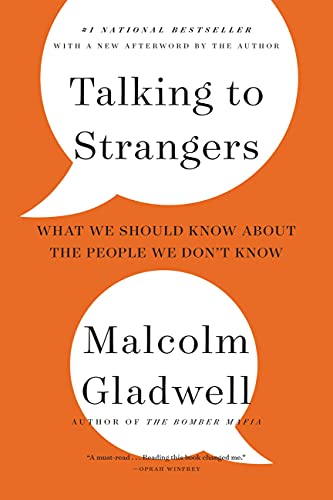
Talking to Strangers: What We Should Know about the People We Don't Know
A Best Book of the Year: The Financial Times, Bloomberg, Chicago Tribune, and Detroit Free Press
How did Fidel Castro fool the CIA for a generation? Why did Neville Chamberlain think he could trust Adolf Hitler? Why are campus sexual assaults on the rise? Do television sitcoms teach us something about the way we relate to one another that isn’t true?
Talking to Strangers is a classically Gladwellian intellectual adventure, a challenging and controversial excursion through history, psychology, and scandals taken straight from the news. He revisits the deceptions of Bernie Madoff, the trial of Amanda Knox, the suicide of Sylvia Plath, the Jerry Sandusky pedophilia scandal at Penn State University, and the death of Sandra Bland—throwing our understanding of these and other stories into doubt.
Something is very wrong, Gladwell argues, with the tools and strategies we use to make sense of people we don’t know. And because we don’t know how to talk to strangers, we are inviting conflict and misunderstanding in ways that have a profound effect on our lives and our world. In his first book since his #1 bestseller David and Goliath, Malcolm Gladwell has written a gripping guidebook for troubled times.
Talking to Strangers: What We Should Know about the People We Don't Know by Malcolm Gladwell
In his latest book, Malcolm Gladwell explores the challenges and complexities of human communication, particularly when it comes to interacting with strangers. Gladwell argues that we are often too quick to judge people we don't know, and that this can lead to misunderstandings, conflict, and even violence. He draws on a wide range of examples, from the interrogation of Amanda Knox to the 2008 financial crisis, to illustrate how our assumptions about strangers can be dangerously wrong.
Gladwell's book is a fascinating and thought-provoking exploration of the human condition. He challenges us to rethink our assumptions about strangers and to be more open-minded and empathetic when interacting with them. He also provides some practical advice for how to communicate more effectively with people we don't know.
Key insights from the book:
- We are often too quick to judge people we don't know.
- Our assumptions about strangers can be dangerously wrong.
- It is important to be open-minded and empathetic when interacting with strangers.
- There are some practical things we can do to communicate more effectively with people we don't know.
Why should you read this book?
If you are interested in human behavior, communication, or the challenges of living in a diverse society, then you should read this book. Gladwell's insights are both fascinating and thought-provoking, and his book will challenge you to think differently about the people you don't know.
Rating: